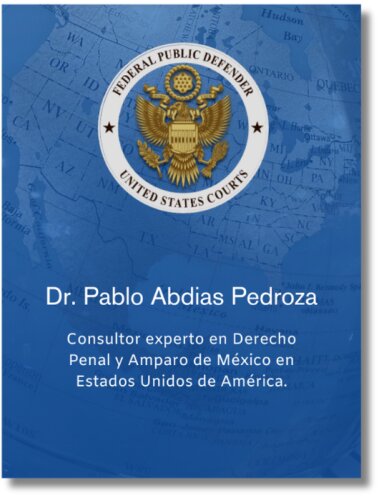Best Juvenile Law Lawyers in Aguascalientes
Share your needs with us, get contacted by law firms.
Free. Takes 2 min.
List of the best lawyers in Aguascalientes, Mexico
About Juvenile Law in Aguascalientes, Mexico
Juvenile Law in Aguascalientes, Mexico, is a specialized area of the legal system that deals with minors involved in criminal activities or any legal proceedings. This area of law aims to provide rehabilitative rather than punitive measures, focusing on the well-being and development of young people. The system recognizes that juveniles are different from adults in terms of psychological and social development and thus requires different considerations and protective measures.
Why You May Need a Lawyer
Several situations may necessitate the assistance of a lawyer specializing in Juvenile Law. These include instances where a minor is charged with a criminal offense, is a victim of crime, or if their custodial rights are in question. Legal assistance ensures that juveniles receive a fair trial and that their rights are safeguarded at all times. Furthermore, legal advisors can help in scenarios involving educational rights, juvenile detention, and cases of neglect or abuse.
Local Laws Overview
Aguascalientes recognizes a separate set of procedures and legal frameworks for juvenile justice, distinct from adult criminal proceedings. The key aspects include a focus on rehabilitation, community service, counseling, and other corrective measures rather than detention. The Juvenile Justice System ensures privacy for minors and seeks to reintegrate them into society as responsible individuals. Integral to this framework are dedicated juvenile courts and programs that address family and societal elements influencing juvenile behavior.
Frequently Asked Questions
What age group falls under the jurisdiction of Juvenile Law in Aguascalientes?
Juvenile Law generally applies to individuals under 18 years of age engaged in criminal or civil legal proceedings.
Are juvenile records made public in Aguascalientes?
No, juvenile records are typically sealed to protect the privacy of minors, ensuring that past issues do not affect their future opportunities.
What happens if a minor is convicted of a serious offense?
A conviction can result in a range of rehabilitative interventions, such as community service or participation in treatment programs, rather than imprisonment.
Can a juvenile be tried as an adult in Aguascalientes?
In some severe cases, it may be possible for a minor to be tried as an adult, but this is rare and subject to specific legal processes.
Do minors have the right to legal representation?
Yes, minors have the right to legal representation to ensure their rights are protected during any legal proceedings.
How are parents involved in juvenile legal proceedings?
Parents or guardians are typically involved as key participants, ensuring the minor’s support system is engaged through the process.
What rights do juveniles have if taken into police custody?
Juveniles have the right to have a lawyer present and must be informed of their rights in a language they understand. Parents or guardians should also be notified promptly.
How does the Juvenile Court System support rehabilitation?
The system provides therapeutic programs, educational opportunities, and community service options to promote the minor’s constructive reintegration.
What is the role of social services in juvenile cases?
Social services may offer support and interventions to help address the underlying issues contributing to the minor’s behavior, such as family counseling.
Are there alternatives to detention for juveniles?
Yes, alternatives like probation, community service, or mandated educational programs are often used instead of detention.
Additional Resources
For more support and information, consider reaching out to local legal aid societies, the Aguascalientes branch of the National System for Integral Family Development (DIF), or the Juvenile Justice Court in Aguascalientes. These institutions can provide guidance, support, and legal referrals.
Next Steps
If you need legal assistance concerning Juvenile Law in Aguascalientes, it is essential to consult with a qualified legal professional experienced in juvenile cases. Start by gathering all relevant information and documentation related to the case. Consider reaching out to local bar associations for referrals to specialists in Juvenile Law. Timely legal advice can significantly impact the outcome of juvenile cases, so prompt action is advised.
Lawzana helps you find the best lawyers and law firms in Aguascalientes through a curated and pre-screened list of qualified legal professionals. Our platform offers rankings and detailed profiles of attorneys and law firms, allowing you to compare based on practice areas, including Juvenile Law, experience, and client feedback.
Each profile includes a description of the firm's areas of practice, client reviews, team members and partners, year of establishment, spoken languages, office locations, contact information, social media presence, and any published articles or resources. Most firms on our platform speak English and are experienced in both local and international legal matters.
Get a quote from top-rated law firms in Aguascalientes, Mexico — quickly, securely, and without unnecessary hassle.
Disclaimer:
The information provided on this page is for general informational purposes only and does not constitute legal advice. While we strive to ensure the accuracy and relevance of the content, legal information may change over time, and interpretations of the law can vary. You should always consult with a qualified legal professional for advice specific to your situation.
We disclaim all liability for actions taken or not taken based on the content of this page. If you believe any information is incorrect or outdated, please contact us, and we will review and update it where appropriate.









